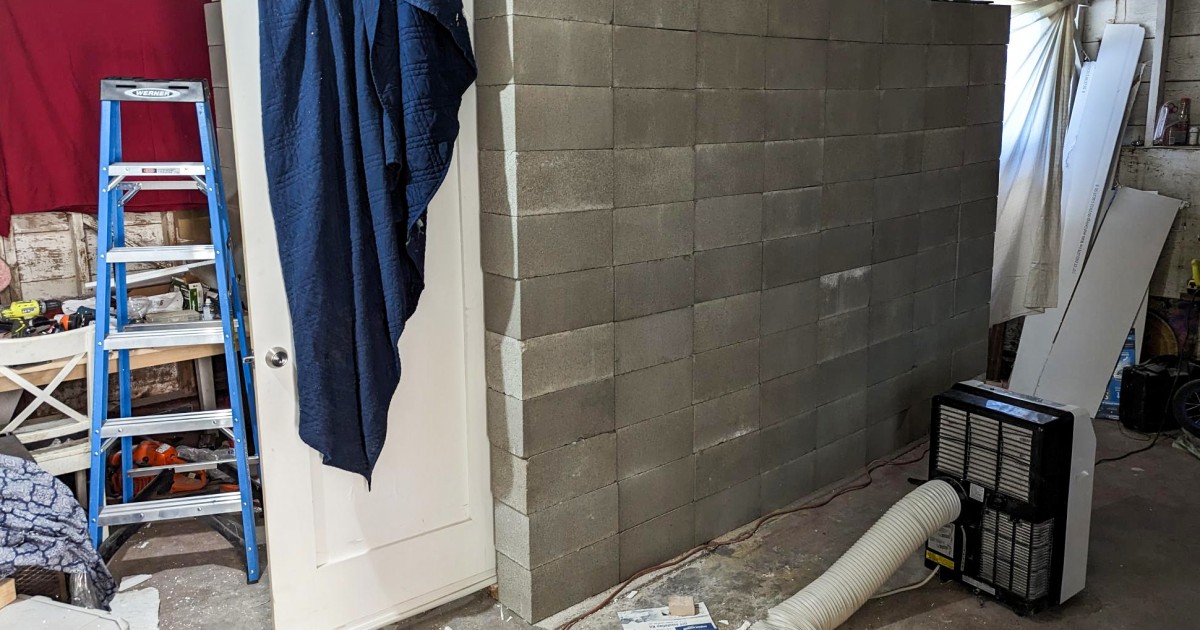Oregon
Suspect in Oregon cinderblock cell kidnapping targeted sex workers in prior crimes, FBI believes

The man accused of kidnapping and sexually assaulting a sex worker in Oregon is believed to have targeted sex workers in prior crimes, the FBI said Monday.
Negasi Zuberi, 29, was arrested last month after a woman escaped a makeshift cinderblock cell where he allegedly kept her hostage, according to the FBI. The woman also accused him of “repeatedly” sexually assaulting her, FBI agent Stephanie Shark told NBC News.
Zuberi is being investigated in at least four other sexual assaults in at least four other states. The FBI is now looking for anyone else that may have been a victim of Zuberi.
“Based off the information that we have, sex workers were part of the population that he targeted, but also other roommates, or other people he felt that didn’t have connections to anybody else,” Shark said.
A note was also found at Zuberi’s residence in the investigation that indicated he had plans for other assaults.
One of the most “chilling” aspects of the note was that Zuberi allegedly wrote “make sure that they don’t have a bunch of people in their lives,” Shark said.
The FBI is asking any potential victims or tipsters to reach out by contacting their hotline, 1-800-CallFBI, or submit a tip at through the investigation website.
She noted that sex crimes are difficult investigations because victims don’t always feel they will be believed and suspects don’t always look like monsters.
“You know, a lot of them are the people next door and the people you’d never understand or believe would be capable of doing these things,” Shark said. “Which makes this case so shocking. Nobody thinks their neighbor will have a cinderblock cell next door in a family neighborhood.”
Officials said that Zuberi may have used several methods to target victims, including drugging drinks and impersonating a police officer. Some of the encounters may have been filmed and victims were threatened with violence if they notified police, the FBI said on its investigation web page.
“I’m hoping we caught him in time,” Shark said. “That’s always our goal with escalating violence, that we were able to stop him before someone actually died.”
According to a criminal complaint in the Oregon incident, Zuberi solicited the woman, a sex worker, in Seattle. He then posed as a police officer and took her into custody. They then traveled 450 miles to Klamath Falls, Oregon, where he had created a makeshift cell in a home he was renting.
The woman’s hands were bruised and bloody after “beating” on the cell “for hours,” Shark said.
“She spent upwards of several hours beating down the cell…which consisted of, obviously, the cinderblock walls but also some drywall and a metal gate with a screened mesh over that,” Shark said. “And she just kept beating any piece of that cell she could until she was able to break free and run for help across the street.”
Zuberi was taken into custody in Reno, Nevada, on July 16 after a 45-minute standoff with police.
Zuberi has lived in 12 states — California, Washington, Oregon, Colorado, Utah, Florida, New York, New Jersey, Michigan, Illinois, Alabama and Nevada — over the last decade, the FBI said.
He has also used the aliases “Sakima,” “Justin Hyche” and “Justin Kouassi,” according to authorities.
The investigation timeline begins in July 2014 when Zuberi was in Orlando, Florida, and moves through several states until May 2023 in Denver, Colorado, according to information shared with NBC News. Major cities where Zuberi frequented also include New York City, Chicago, Las Vegas and Portland, Oregon.
He was also known to have been in several cities in California between 2012 and 2021: Antioch, Vacaville, Oakland, Azusa and Granada Hills.
“We would like any victims of his his crimes, to feel empowered to come forward so that they can rewrite their endings,” Shark said. “They no longer need to be afraid.”

Oregon
Oregon Ethics Commission nixes investigation into Gov. Kotek, First Lady

The commission said its analysis would be different if Aimee Kotek Wilson received a salary or other private benefits
PORTLAND, Ore. (KOIN) — The Oregon Government Ethics Commission has decided against launching a full investigation into complaints concerning Gov. Tina Kotek and her wife, Aimee Kotek Wilson.
At a meeting on Friday, the agency examined the preliminary report on the case involving a potential Office of the First Spouse before determining that the governor did not violate any ethics laws — including those on conflicts of interest or nepotism.
“We note that had the Governor unilaterally decided to provide the First Lady with a salary or other private benefits, the above analysis would be different,” the commission wrote in its preliminary review. “The analysis would also be different if there was any suggestion that the public duties of the First Lady could financially benefit a private business with which the First Lady was associated.”
In late March, news broke that Kotek Wilson had an office in the governor’s base of operations at the state library and an on-loan staffer from the Department of Administration Services. With a master’s degree in social work, the First Lady was also known to attend official meetings regarding behavioral health.
The following week, the governor clarified that her wife was solely an “unpaid volunteer with both lived and professional experience.” Kotek also announced she had asked the Ethics Commission for guidance on a potential Office of the First Spouse, but the commission later said it couldn’t advise her because of its plans to review complaints on the same matter.
Subsequently, the governor abandoned plans to create the First Lady’s office.
“After listening to and reflecting on the concerns of Oregonians who have contacted my office, as well as the advice of staff, I want to be clear about next steps: There will not be an Office of the First Spouse,” Kotek said.
The announcement came after her office released several emails from senior staff members who abruptly left their positions earlier in the year. In one email, Kotek’s former Chief of Staff Andrea Cooper said she was “asked not to attend” a meeting where events were added to Kotek Wilson’s calendar.
Oregon
U.S. Supreme Court sides with Oregon city, allows ban on homeless people sleeping outdoors • Maine Morning Star

The U.S. Supreme Court Friday sided with a local ordinance in Oregon that effectively bans homeless people from sleeping outdoors, and local governments will be allowed to enforce those laws.
In a 6-3 decision, Justice Neil Gorsuch wrote in the opinion that the enforcement of those local laws that regulate camping on public property does not constitute the Eighth Amendment’s prohibition on cruel and unusual punishment.
“Homelessness is complex. Its causes are many. So may be the public policy responses required to address it,” he wrote. “The Constitution’s Eighth Amendment serves many important functions, but it does not authorize federal judges to wrest those rights and responsibilities from the American people and in their place dictate this Nation’s homelessness policy.”
The case originated in Grants Pass, a city in Oregon that argues its ordinance is a solution to the city’s homelessness crisis, which includes fines and potential jail time for repeat offenders who camp or sleep outdoors.
Justice Sonia Sotomayor wrote a dissent arguing that the ordinance targets the status of being homeless and is therefore a violation of the Eighth Amendment.
“Grants Pass’s Ordinances criminalize being homeless,” she wrote. “The Ordinances’ purpose, text, and enforcement confirm that they target status, not conduct. For someone with no available shelter, the only way to comply with the Ordinances is to leave Grants Pass altogether.”
During oral arguments, the justices seemed split over ideological lines, with the conservative justices siding with the town in Oregon, arguing that policies and ordinances around homelessness are complex, and should be left up to local elected representatives rather than the courts.
The liberal justices criticized the city’s argument that homelessness is not a status protected under the Eighth Amendment’s prohibition of cruel and unusual punishment. The liberal justices argued the Grants Pass ordinance criminalized the status of being homeless.
The Biden administration took the middle ground in the case, and U.S. Deputy Solicitor General Edwin Kneedler offered partial support.
“It’s the municipality’s determination, certainly in the first instance with a great deal of flexibility, how to address the question of homelessness,” he said during oral arguments in late April.
This is a breaking news story and will be updated.
Oregon
OHA: Oregon needs 3,700 mental health, substance abuse treatment beds, closing gap could cost $170 million a year – KTVZ

SALEM, Ore. (KTVZ) – Oregon needs up to 3,700 adult mental health and substance use treatment beds to close existing gaps and meet future service projections, according to a final Oregon Health Authority study of the state’s behavioral health continuum of care.
The findings are part of an assessment that Governor Tina Kotek directed the OHA to commission last year. The report was produced by Public Consulting Group, a public sector solutions implementation and operations improvement firm that has produced similar studies in Washington and other states.
The findings inform an ongoing funding and implementation effort that state leaders are committed to pursue, which could take several biennia to complete, according to OHA’s news release, which follows in full:
According to the final Behavioral Health Residential + Facility Study report, closing the gap could require investments of as much as $170 million per year over the next five years and the creation of approximately 650 new beds per year.
The final report includes a new five-year funding recommendation that recognizes the importance of:
- Increasing the behavioral health workforce to support expanded capacity.
- Improving access to mental health and substance use disorder support services to help individuals stay within their communities.
- Expanding supportive and transitional housing opportunities.
State health officials will continue to work with Governor Kotek and the Legislature to apply the study’s findings and guide investments toward closing the gap in treatment services.
“We don’t get to choose between adding beds, and adding workforce. We must do both in order to make real change in our behavioral health system. It’s important to note that capacity in Oregon’s behavioral health system is dynamic, and the data in the report represent a point-in-time snapshot of one part of a broader continuum of care,” said OHA Behavioral Health Director Ebony Clarke.
“This report provides us with critical data to inform how we prioritize the creation of more treatment beds and it also underscores the broader understanding that we need to continue to invest in solutions that reduce the number of beds needed,” Clarke said. “We do this through investing in protective factors and earlier intervention – additional community-based programming, crisis and outpatient programs, in addition to other supportive services – to prevent people who are experiencing mental illness or substance use from progressing to a level of severity in their illnesses that would require treatment in a more acute setting.”
The final report follows the draft preliminary report released in February.
At the direction of OHA, the final report reflects updated data for the facilities within scope for this study. Although there is no perfect methodology for determining the appropriate number of high-acuity beds in a behavioral health system, PCG used state and national data sets, findings from peer-reviewed literature and surveys of treatment facilities to estimate mental health and SUD treatment bed capacity and needs within the continuum of care. PCG worked at the direction of OHA to include Oregon-specific data.
Even as the report was finalized, state officials were moving quickly to supplement capacity and have already identified several short-horizon “priority” projects, which are likely to bring community beds online within the next year or two and to address what are considered critical service gaps. OHA is working to publish a dashboard later this summer that will track and highlight progress toward new beds coming online.
Over the past four years, the Oregon Legislature has invested more than $1.5 billion to expand behavioral health treatment capacity, raise provider payment rates and stabilize the treatment workforce. Oregon’s current capacity shortfall would be even greater without these investments.
According to the report, recent legislative investments from HB 5202 (2022) and HB 5024 (2021) have supported the creation of 356 new licensed mental health residential beds (exclusive of adult foster homes), SUD residential, and withdrawal management beds, which are under construction and scheduled to open by the third quarter of 2025.
-

 News1 week ago
News1 week agoRead the Ruling by the Virginia Court of Appeals
-

 News1 week ago
News1 week agoTracking a Single Day at the National Domestic Violence Hotline
-

 Fitness1 week ago
Fitness1 week agoWhat's the Least Amount of Exercise I Can Get Away With?
-

 News1 week ago
News1 week agoSupreme Court upholds law barring domestic abusers from owning guns in major Second Amendment ruling | CNN Politics
-

 Politics1 week ago
Politics1 week agoTrump classified docs judge to weigh alleged 'unlawful' appointment of Special Counsel Jack Smith
-

 Politics1 week ago
Politics1 week agoSupreme Court upholds federal gun ban for those under domestic violence restraining orders
-

 Politics1 week ago
Politics1 week agoNewsom seeks to restrict students' cellphone use in schools: 'Harming the mental health of our youth'
-

 Politics1 week ago
Politics1 week agoTrump VP hopeful proves he can tap into billionaire GOP donors















